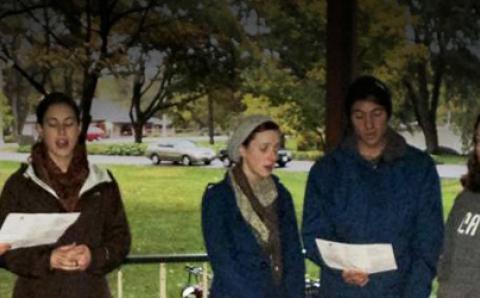How can your bathroom habits improve the quality and quantity of the food you produce?
The chief of the village of Boura shows off a new eco-friendly latrine.
Many families in Mali asked themselves this question after the Christian Reformed World Relief Committee (CRWRC) and its local partner, ODES, first talked to them about EcoSan latrines.
Several people already had learned the value of “deep-pit latrines” and how they reduced the spread of disease. But EcoSan latrines were different. They require a much shallower pit than traditional latrines and enable communities to safely compost human manure into organic fertilizer.
Although skeptical, people agreed to use the latrines. After a year and a half, noticing marked differences in their crop yields, they were eager to learn more.
Many people in the developing world do not use toilets or latrines, instead relieving themselves behind bushes or trees. This, in turn, has increased the spread of disease, especially when waste products seep into the local water supply.
To combat this sanitation issue, many nonprofit organizations, including CRWRC, have encouraged the communities where they work to build and use deep-pit latrines. These latrines improve hygiene, contain waste, and limit the spread of germs. When a pit is full, it is covered over and a new latrine built.
But CRWRC sees a better solution in the EcoSan latrines.
“While the idea may sound bizarre, it is actually quite ingenious,” said Jan Disselkoen, a CRWRC representative. “By adding a handful of wood ash and a handful of soil to the pit after each use, flies are repelled, diseases are destroyed, and there is no foul odor.”
Each family digs two pits. The average family of five fills a pit in six months. When that pit is full, the family moves to the second pit.
The first pit is covered and left for six more months for the human manure to compost. At the end, the rich compost is removed and used on the family’s field or garden. Since the second pit should then be full, the latrine is returned to the first pit and the cycle continues.
CRWRC has been promoting EcoSan latrines for several years in African countries, and communities have seen huge boosts in the production of crops.
Even in years of scarce rain, the EcoSan latrine has provided the compost people might not have otherwise had.
As they introduce this program in other areas, CRWRC representatives are asking people to keep the promotion of this program in their prayers.
About the Author
Kristen deRoo VanderBerg was part of the World Renew Communications team from 1999-2016. She now serves as director of Communications & Marketing for the Christian Reformed Church.









